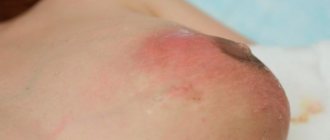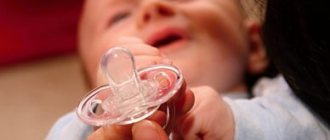The first weeks of a baby’s life, when everything in the house is subordinated to ensuring that the newly born child is surrounded by warmth, care and adoration, two feelings are raging in the hearts and heads of young parents. Boundless love for this small, warm, dear person, which sometimes overwhelms you so much that it becomes difficult to breathe. This is the first and main thing.
The second feeling is fear. Fear of causing pain to a defenseless baby with an awkward movement. Wrong actions will bring discomfort into his still helpless existence. And if some anomaly arises in the baby’s behavior, half of the mothers panic and run as fast as they can to a more experienced friend, a wise grandmother, or take the child to the doctor.
Probably the very first such anomaly is regurgitation of milk after eating. I would like to say right away that under no circumstances should you invent all sorts of horrors. You just need to calm down and carefully consider what exactly the baby burped.
Causes of regurgitation
A completely healthy toddler with a good appetite under the age of one year still does not know how to control either the amount of food he eats or the correctness of its intake. The cause of regurgitation may be banal overeating, especially if he eats mother's milk. The process of breastfeeding calms the baby, gives him a feeling of security and he is ready to do this for hours. The tiny stomach, which cannot yet stretch, and the short esophagus quickly fill up and the body resorts to the only way it knows how to get rid of the excess.
Causes of regurgitation in infants
The second reason is air getting into the mouth. Here all the blame lies with the mother. You need to carefully ensure that the baby takes the nipple tightly, and if you feed from a bottle, you need to hold it at the right angle and at the same time make sure that after shaking the mixture all the foam rises up. You should also choose the optimal size of the hole in the nipple so that not a single air bubble leaks out.
If the little one is cheerful, active, gaining weight well and regurgitation, if it occurs, then no later than an hour after he ate a hearty meal, then everything is fine and there is nothing to worry about. The gastrointestinal tract is not fully formed and strengthened, it is still adapting and some problems in its functioning are quite normal. Over time, when the stomach learns to stretch and the muscles responsible for the functioning of the esophagus and intestines become stronger, everything will return to normal.
These reasons are clear to everyone, they do not pose a great danger to the baby’s health and are easily eliminated. However, if a child burps up a mass in which yellow streaks, inclusions, or the entire vomit is clearly yellow in color, are noticeable, this is a reason not only to think about it, but also to contact a specialist. And if this happens periodically and is accompanied by crying, screaming and unnatural movements - even more so. In this case, comprehensive research and prompt diagnosis are necessary. You should start by seeing a pediatrician and having your child undergo a diagnostic ultrasound of the abdominal cavity.
Regurgitation with bile
The phenomenon of regurgitation is explained by the specific structure of the gastrointestinal tract in newborns.
But the bile that appears during regurgitation is an alarm bell. Its presence is indicated by the yellowish-green color of the masses. This may indicate congenital disorders in the development of the esophagus and other gastrointestinal organs. While suckling at the breast in the first days of life, the newborn swallows air, which is the reason why the baby begins to spit up. A similar situation occurs when overeating. But if a newborn belches the remains of yellow milk, this shows that there are disturbances in the digestion process.
In this case, the baby must be shown to a doctor immediately.
The release of bile during regurgitation is a very serious reason to consult a doctor.
Causes of the condition, danger
Babies born prematurely, or with intrauterine developmental disorders, spit up more than others. This may occur due to intrauterine or postpartum suffocation. Bile also appears in vomit after swallowing amniotic fluid.
In the future, this may cause the child to become more energetic—he may involuntarily shudder and scream. In this case, you need to contact a neurologist. Food from the stomach returns to the esophagus, and if there is an admixture of bile, it irritates the mucous membrane, and the baby experiences pain, so he begins to cry and scream.
Remains of food also sometimes end up in the nasopharynx and lungs, and the baby subsequently faces chronic respiratory diseases.
Babies who do not feed on mother's milk or who do not receive enough of it can also vomit yellow masses. The main advice here is to resume breastfeeding.
But if the mother’s milk has disappeared, this will be problematic. However, it is quite possible to speed up lactation.
You need to eat foods that will stimulate milk production, and at the same time put your newborn to the breast more and more often.
The appearance of bile when a baby burps can also indicate a disease such as intestinal obstruction. This is a congenital pathology, which is determined, if not in the first few hours of life, then in the first few days.
Symptoms of the disease are noticeable already at the first feedings: the child regurgitates a large amount of food along with mucus. Then they begin to observe the reactions of the baby’s tummy.
If before belching it is enlarged, and after the size decreases significantly, then almost immediately a diagnosis is made - intestinal obstruction.
In addition, regurgitation of yellow masses can be a symptom of several diseases at once: otitis media, pneumonia, constipation. It is necessary to monitor the child’s condition - record body temperature, behavior, stool. Often a newborn begins to whine, press his legs to his stomach, and become irritated for no reason. Immediate consultation and examination by a doctor is necessary.
Regurgitation or vomiting of bile in newborns: how to distinguish?
Regurgitation with or without bile is usually a consequence of improper feeding or problems with the gastrointestinal tract.
Vomiting and regurgitation in children are different phenomena. Vomiting manifests itself as an intense release of stomach contents, accompanied by nausea.
When a baby burps, it is not accompanied by nausea or intense force of food release. This is a mechanical process caused by problems with the functioning of the gastrointestinal tract. Regurgitation in a healthy baby is not accompanied by unpleasant sensations, the child does not feel discomfort, and may even smile.
Vomiting, unlike regurgitation, occurs regardless of food intake and can be repeated several times.
Most often, a child vomits due to improper latching on the breast during feeding or due to overeating (artificial feeding).
- If the vomit of a baby in the first month of birth is yellowish in color, there is reason to suspect a pathology of the gastric outlet, which connects the organ to the intestines. In this case, it is very small in size, so even liquid food cannot enter the intestines, and vomiting occurs. This disorder can only be corrected surgically, so if symptoms occur, you must urgently seek medical attention.
- Vomiting with bile often occurs due to spasm of the pylorus. This occurs due to the fact that the baby’s muscles are not yet sufficiently developed, and after feeding they do not relax at the right time, which provokes the eruption of food. Such babies should be fed often, but in small portions, otherwise they will gain very little weight.
- Vomiting of yellow masses, accompanied by bloody discharge from the anus, may indicate another dangerous disease - intestinal obstruction. Also, in a baby with this problem, you may notice severe pallor, as well as severe pain when touching the abdomen. Here, only surgical intervention is possible, and urgent.
Diagnostics
Frequent and uncharacteristic regurgitation in children will require examination by a doctor and testing.
If a child regurgitates bile, this can be a symptom of many diseases:
- Pathology of the gastrointestinal tract - narrowing of the pyloric part of the stomach. After a few weeks of life, the baby not only does not gain weight, but also loses it, and regurgitation becomes constant.
- Damage to the nervous system. In severe pregnancy and difficult childbirth, intracranial pressure may increase. The baby constantly burps yellow masses, and there is also tremor of the upper limbs and chin.
- Infection. Belching is accompanied by lethargy, pallor, and constant crying.
- Pneumonia. Regurgitation turns into vomiting, stool becomes liquid, and the skin around the mouth and nose turns blue.
Regurgitation becomes a real challenge for the baby and parents. It can lead to weight loss, loss of appetite, and metabolic disorders. In addition, in the early stages of life, it is necessary to strictly ensure that vomit does not enter the infant’s respiratory tract and he does not suffocate.
Treatment of regurgitation
If your baby begins to spit up masses of yellow color, it is best to consult a doctor. Only he can determine whether this is a consequence of pathology in the development of the gastrointestinal tract or whether there are other reasons.
In the first case, treatment is prescribed only by a physician, and even surgical intervention may be necessary. If the cause is otitis media, pneumonia or another disease, you need to eliminate them first, then the baby’s digestion will also normalize.
Additionally, you can take some measures to help eliminate regurgitation if the baby is healthy.
Prevention
- Don't overfeed your baby. Don't let him suckle quickly, make sure he doesn't swallow air.
- Try to let it cover not only the nipple, but also the areola, then the likelihood that the baby will swallow air and start burping will be minimal.
- Make sure that the nose does not rest against the chest, otherwise breathing will be difficult and the baby will begin to swallow air.
If the baby is bottle-fed, do not allow air to get into the nipple, try to fill the bottle completely with milk.
Let your child eat by placing him in a semi-upright position - this way you will minimize the likelihood of swallowing air. Be sure to introduce breaks in feeding: 5 minutes of eating, then a break for a couple of minutes in an upright position, etc. After feeding, the baby needs rest, do not disturb him, do not start playing with him.
Hold him upright and let him burp, then let him rest. If all these methods do not help, the child continues to spit up frequently, and at the same time bile appears again and again, only a pediatrician can give the correct recommendations.
Source: https://infopechen.ru/zhelch/pri-srygivanii.html
What causes a baby to spit up yellow?
There are several reasons and it’s worth starting with the most unpleasant one, but reassure us right away - this situation is very rare. Congenital pathology that arises during a difficult pregnancy, improper behavior of the mother at a time when she was carrying a child under her heart (smoking, alcohol, junk food, trauma) or difficult childbirth, can be expressed in intrauterine disorders that entail incorrect development of internal organs. This especially applies to premature babies or those born with postpartum asphyxia. The passage of food from the stomach into the esophagus can also be caused by the ingestion of amniotic fluid.
This can also affect the overall development of the baby. He may experience sudden screams, flinching and bouts of increased activity. In this case, observation by a neurologist is absolutely necessary. The symptoms are usually pronounced and leave no doubt about the diagnosis for a good specialist. Treatment consists mainly of changing the little man’s life schedule, streamlining all necessary actions and, in exceptional cases, using medication.
Here are a few more reasons why a baby may spit up yellow masses.
Taking antibiotics is one of the reasons for regurgitation of yellow
- poor lactose tolerance. Occurs when there is a deficiency or complete absence of a necessary enzyme. In this case, after a short and short examination, the doctor usually prescribes lactose-free mixtures and the problem is very quickly eliminated. The baby begins to gain weight again, smiles, and practically stops spitting up.
- the problem may arise after taking antibiotics that do not have a beneficial effect on the stomach and intestines. It should be emphasized that such drugs should be given to the baby only as prescribed by a doctor, and at the slightest suspicion of their negative effects, consult your pediatrician.
- all kinds of infectious diseases against which the small organism has not yet developed a defense mechanism. Meningitis, hepatitis, stomach infections - usually accompanied by colic, unmotivated anxiety, diarrhea and fever.
- An allergy is also possible, both to the feeding mixture and to the foods that the nursing mother eats.
- intestinal obstruction. The main sign is if the baby’s tummy increases during feeding and then drops sharply. In this case, it is necessary to consult a gastroenterologist, undergo an examination and prescribe the correct treatment method.
FAQ
- Why does my baby spit up after every feeding? This is a physiological and absolutely normal phenomenon. Belching is air that has entered during feeding. Naturally, a small amount of formula or milk comes out with burping. Regurgitation in newborns and infants up to 3–4 months is observed after each feeding, 5–10 minutes later. Then it becomes more rare; after 4 months, the baby may burp 1-2 times during the day. Sometimes a mother thinks that the baby has burped too much when she sees a mark left on clothes or a diaper. It is recommended to conduct an experiment: pour two tablespoons of water onto clothes and look at the size of the wet spot.
- Why doesn't my baby spit up after feeding? In rare cases, mothers have this opposite question. This fact should only please you, not worry you. There are several assumptions about this: while breastfeeding or bottle feeding, the baby almost does not swallow air and never overeats. There is one more, fantastic and encouraging, assumption: an intellectual, and that says it all... According to the observations of many mothers, the majority of babies who do not burp develop hiccups after feeding. By the way, it may be associated with swallowing air and overeating.
- Until what age do babies spit up? Typically, children stop burping at 6–7 months, when they begin to sit and increasingly assume an upright position while awake. Also, introducing complementary foods and eating thick foods in the diet leads to a decrease in the frequency of regurgitation. If the baby is older than six months, and regurgitation is frequent and does not stop, you need to consult a doctor. The child may have neurological disorders. You also need to know that regurgitation is associated with undeveloped muscles of the cardiac part of the stomach. This deviation is not considered a pathology and is observed in all infants. But these muscles develop differently in each baby. The final functional maturity of the cardia (lower esophageal sphincter) occurs only at the age of 8 years. This is why it is much easier and faster for children to vomit than for adults.
- Why does a child spit up like a fountain? The danger of excessive regurgitation is that the baby loses a lot of fluid and weight. And this is a vital indicator in infants. There is also a danger of choking in your sleep. If weight gain is normal, diapers are filled regularly, and the child feels great, it is unlikely that he has dehydration, any digestive problems, or neurological disorders. If regurgitation occurs several times daily and resembles vomiting, you should immediately consult a pediatrician. You may need the help of specialized specialists - a neurologist, gastroenterologist, infectious disease specialist, surgeon. The doctor will recommend switching to anti-reflux nutrition and prescribe medications to regulate intestinal motility.
- Why does a baby spit up curd? Because the milk has already been digested. This usually happens 30–40 minutes after feeding. This often happens after the child moves or plays actively. If the baby spits up no more than 2 tablespoons of curdled milk, this is normal. If there is excessive cheesy regurgitation, if its color changes, or if an unpleasant odor appears, you should definitely consult a doctor.
- If the baby burped yellow? This indicates the presence of bile. A one-time incident usually does not pose any threat to the baby’s health, but it is better to tell your pediatrician about it. If yellow regurgitation is repeated and the child behaves restlessly, you should immediately see a doctor. Bile can indicate pathologies of the digestive organs.
In the first months of a baby's life, parents have to deal with a huge number of new, often unexpected situations that cause concern and anxiety. In most cases, this anxiety is not justified and arises due to ignorance
, but this does not always happen. For example, many people tend to worry about why a child spits up a certain amount of food after feeding. What is this? Sign of illness or normal? Is it worth fighting this? Does this cause discomfort for the baby? Let's figure it out.
Something makes me sick...
From a medical point of view, regurgitation in newborns is the passive, involuntary throwing of small amounts of stomach contents into the esophagus and back into the mouth. In infants it is very often combined with the passage of a small amount of air.
Babies can vomit either milk or formula, or curdled product.
Doctors say that according to statistics, more than 60% of children under the age of 4 months experience this problem. With age, the number of regurgitations decreases and by 7-12 (less often by 18) months they completely disappear
. In the vast majority of cases, the situation normalizes without the use of special therapy or specialist intervention.
Recommendations for young mothers
Recommendations for nursing mothers
- Before feeding the baby, you should put his tummy down for a while. This will ensure the removal of excess gases, as well as strengthen the muscles in the neck and abdomen.
- You shouldn’t wait until your child is very hungry. In this case, he will suck greedily and the entry of air into the stomach will be almost inevitable. It can also lead to overeating.
- Carefully ensure that the baby takes the nipple correctly, completely capturing the areola. If, while sucking, the little one begins to smack his lips or hear any other sounds, it means that he is uncomfortable and needs to be attached to the breast in the optimal way.
- When feeding baby formula from a bottle, ensure the optimal size of the hole in the nipple and the correct angle of inclination. It should be such that the baby does not choke, but also does not make unnecessary efforts.
- after the child has eaten, hold him in a column and wait until the excess air, if it does get into the stomach, goes away. Usually this happens immediately, but it can take 20-30 minutes. Again, there’s nothing wrong with that.
- The headboard in the stroller and in the crib should be slightly raised. You should place a thin book or thin pillow under the mattress, but make sure that not only your head, but the entire upper part of your body is raised.
- If your baby is bothered by gases, you can give him drugs with fennel extract to drink.
- feed the child according to the schedule. The baby will get used to it very quickly and will not experience a strong feeling of hunger.
- strictly ensure that the mixture corresponds to age and personal indicators, if any.
- Daily walks in the fresh air and swimming are required. Active, age-related exercises that will lead to strengthening of muscles, including those responsible for the digestive system.
When a young mother and baby are discharged from the maternity hospital and, accompanied by a loving husband and father, who shed tears of tenderness and joy, and grandparents, come home, all the joys and difficulties can pile up with such speed that it can be shocking. There is no point in being afraid, panicking, much less despairing and falling into postpartum depression. You should remember that now not only your life depends on you, but also the life of your son or daughter, and excessive negative emotions will not benefit either you or the child.
Firstly, the baby, no matter how defenseless he may look, is already at this age a rather strong and willful creature. He will definitely inform his attentive parents in one way or another that he doesn’t like something or is experiencing some discomfort. And how will he demand that these inconveniences be eliminated? And secondly, as for regurgitation, there is nothing overly dangerous about it. The vast majority of the reasons for this are easily eliminated and do not have any harmful consequences. And it’s not difficult to wash a robe or shirt that your baby has burped on.
In case of any complications, there is always a children's clinic and wonderful pediatricians who came to the profession at the call of their souls. They worry about your baby no less and are ready to do everything in their power for him.
Why did the baby vomit a mass of yellow color: a newborn spits up while breastfeeding
Regurgitation in infants occurs quite often; this is not a pathology. It occurs due to the high sensitivity of the gastric mucosa, weak muscles of the digestive tract and the structural features of the gastrointestinal tract. If a child begins to vomit yellow, this may indicate the presence of bile in the mass, which is a reason to consult a doctor.
Recovered baby
Can a healthy baby burp?
Of course yes. This is a normal reflex designed to help your baby get rid of excess food or air trapped in the stomach. Up to 7-9 months, regurgitation is an absolutely natural phenomenon, provided that no more than an hour has passed after eating and the baby feels well. Dr. Komarovsky also wrote that this is the norm.
Dissatisfied baby
If food is expelled in too large quantities, frequently, or the child feels unwell, this may indicate some kind of illness.
Causes of regurgitation :
- The baby takes the nipple incorrectly when breastfeeding or takes food from the wrong bottle when mixed and artificial. Then, when feeding, air can enter the stomach. The problem is solved this way: the baby needs to be taught how to grasp the nipple correctly or replace the bottle with one that fits his oral apparatus.
- The baby eats too actively. The body cannot digest large volumes of milk. To prevent this, you need to take short breaks (literally a few seconds) during feeding.
- Overfeeding. Often parents believe that they need to feed their child at all costs, even if he refuses to eat. This not only leads to regurgitation, but also to eating disorders in adulthood.
- The swaddling is too tight.
Also, food may be asked to come out if the child has an individual intolerance. This is no longer classic regurgitation.
Photograph of a baby
Important! Do not confuse regurgitation and vomiting. The first is the return of food from the stomach, having the same color and consistency (white in color). Therefore, any deviation from this can already be considered vomiting. Differences are also expressed in quantity. In addition, regurgitation occurs after eating, while vomiting can happen at any time.
If , among other things, the following symptoms are observed, this is a reason to worry:
- Regurgitation is carried out in a “fountain”.
- The body can burp more than 30 milliliters of what it eats at a time.
- The child is sad and passive.
- Repeated regurgitation.
- There is fever, diarrhea, bloating and sleep disturbances.
What does yellow burp indicate?
If a newborn burps yellow color, this indicates a disturbance in the digestive process. But this is not always a cause for concern. If at the same time the infant continues to gain weight within normal limits, there is no need to worry. If due to frequent regurgitation there is a lack of body weight, an examination by a specialist is necessary.
Digestive problems
This is the most common reason why belching occurs.
Satisfied baby
If a baby vomits yellow, this may indicate the following problems:
- Air entering the stomach while eating;
- Pathologies of the digestive system;
- Incorrect formation of the esophagus;
- Intestinal obstruction;
- Gastrointestinal infections. Most cases when a child begins to vomit are associated with this point.
Causes of yellow regurgitation
Until what age does a baby spit up?
Yellow belching in newborns occurs due to a large number of reasons:
- Pathologies of intrauterine development of a child, as a result of which the formation of the organs of the digestive system occurs. It is also common for babies to swallow intrauterine fluids and regurgitate them when they are born.
- Poor lactose tolerance. If the baby's body does not produce the enzyme lactase, the child may vomit and cannot gain weight. The problem is solved by switching the little one to lactose-free formulas.
- Taking antibiotics.
- Infectious diseases, in particular poisoning. In this case, in parallel with yellow regurgitation, an increase in temperature, weakness, and lack of appetite are observed.
- Abrupt cessation of lactation or transition to artificial feeding.
- Colostrum or breast milk is orange in color.
Important! Essentially, yellow spit up is more vomiting than a baby's normal body reaction to eating too much food.
It occurs when bile enters the stomach and irritates the esophagus. This can lead to serious consequences for the baby.
If stomach contents enter the lungs while crying, this can lead to a number of serious illnesses.
What to do if your baby burps yellow
How to distinguish vomiting from regurgitation in a baby - characteristic signs
The parent needs to be careful and closely monitor the child’s health. What to do if your baby burps yellow?
Consult a doctor
The recommendation is to consult a doctor, since the reason why a child may burp yellow can be either not very serious or lead to dire consequences. To prevent this from happening in the future, parents are advised to follow these recommendations:
- Some time before feeding, place the baby on his tummy. This will relieve him of excess gas, and also strengthen the muscles of the abdomen and neck.
- Don't wait until your baby is very hungry. Then he will eat too greedily, taking large gulps of air. All this will lead to overeating and, as a result, regurgitation.
- It is important to carefully monitor how your baby takes the breast. The baby should completely cover the areola with her lips. The signal that the breast is taken correctly is the absence of extraneous sounds. If the mother hears them, it is necessary to immediately change the feeding position.
- If your baby is feeding from a pacifier, it is important to feed him at the right angle. The food should not be too plentiful, but there is no need to create additional difficulties for the baby. In addition, it is important that the diameter of the hole through which food passes is not too large. Then you are less likely to overeat and create extra stress on the digestive system.
- For some time after feeding, it is recommended to keep the baby in the column position and wait until the gases go away. As a rule, this happens immediately, say an interval of half an hour.
- Feeding on a schedule is an incredibly important part of feeding your baby well. Over time, his digestive system adapts to the regime, and the baby does not go hungry. It is important to remember the second point here. Breast should be given upon request, but taking into account the baby’s individual schedule.
- It is important to ensure that the head of the baby's stroller is slightly raised. To do this, you need to place pillows or some other soft things under it. Moreover, not only the head, but also the entire upper part of the body should be raised.
- If the baby is too tormented by gases, she can be given medications with fennel extract.
- You should not give your baby formulas that are not appropriate for his age. This can lead not just to regurgitation, but to full-blown vomiting.
Pediatricians also advise regularly taking your baby for walks in the fresh air.
Important! If regurgitation is too profuse, it is necessary to eliminate fluid loss.
You should consult a doctor at the slightest deviation from the norm, namely:
- If the quantity and frequency increase.
- If the volume of regurgitated masses increases.
- If the baby's temperature rises, he behaves restlessly and cries.
- For newborn or infant weight loss.
- If regurgitation occurs at one year of age or more.
- If after regurgitation the child feels hungry or shows signs of dehydration (weakness, paleness, sunken eyes, crying without tears, a small number of trips to the toilet with a small amount of urine).
You need to listen to the baby. Even a newborn child, despite the fact that he seems so defenseless, is already able to clearly state his needs, and even more so than adults.
Therefore, the fears of parents who listen to every wrong action of the child, in their opinion, turn out to be groundless. If something is wrong with the child, it will be known immediately.
If in doubt, you should immediately consult a doctor.
Source: https://kpoxa.info/zdorovie-pitanie/rebenok-srygnul-zheltym-cvetom.html
What else you should know about spitting up in newborns
Babies spit up frequently. There are many reasons for this in babies. Doctors explain this by the sensitivity of the baby’s mucous membrane, underdeveloped stomach muscles, and structural features of the digestive system.
There is no pathology in this. But if the baby burps yellow, parents should perceive this phenomenon as an alarming symptom. This phenomenon may indicate the presence of bile in the vomit. It is necessary to show the baby to a doctor who can prescribe a preventive examination with a surgeon and neurologist.
When should you start worrying?
To begin with, you need to try to determine the cause of regurgitation, carefully assess the baby’s condition, and observe his behavior
. It is also advisable to evaluate the intensity with which the phenomenon repeats. Let's do the math. In cases where this happens 5 times a day or less, and the volume of released food does not exceed 3 ml and has a normal appearance (regular milk/formula or curd) and color, as a rule, there is no need to worry.
If the amount exceeds 5 in one day, if there is a deterioration in the child’s condition, if the regurgitation is profuse (milk or formula in a fountain), turning into vomiting, has a strange appearance or color and an unpleasant, putrid smell, you should immediately call a doctor. In such cases, consulting a pediatrician may not be enough and the baby will be referred for examination to a surgeon and neurologist to rule out the development of serious pathologies.
Your doctor will help determine the cause of your regurgitation.
However, it wouldn’t hurt to consult a pediatrician in any case.
- after all, the doctor will be able to advise what to do, help normalize nutrition and find a simple solution to the problem.
Another reason to see a doctor is if you notice that... This phenomenon is called childhood apnea and most often goes away on its own. However, sometimes it becomes a serious and dangerous disease. It’s so serious that it’s better to go to a specialist right away and not worry about it later.
When is it considered normal?
One of the most common causes of regurgitation is overeating. A newborn baby does not yet know his norm, his gastrointestinal tract is small, large volumes of milk simply cannot fit. The body copes with excess in the most accessible way. Often babies overeat because they love the process of feeding, it calms them down and gives them a feeling of security.
Another reason is improper attachment to the breast. No wonder all pediatricians talk about this. The baby in the correct position should tightly and completely grasp the nipple and areola, his nose should be pressed to the chest, but not too much, so that breathing remains free. The newborn must latch onto the breast correctly. Otherwise, the mother will get injured nipples, and the baby will swallow air.
If the baby is bottle-fed, the cause of regurgitation in the newborn may be an incorrectly selected nipple with a hole that is too large or a bottle pointed at a large angle to the mouth.
Also reasons may be:
- Active activity of the child immediately after feeding.
- Incorrect position after eating.
- Weak muscles of the stomach and esophagus.
Prevention
- Don't overfeed your baby. Don't let him suckle quickly, make sure he doesn't swallow air.
- Try to let it cover not only the nipple, but also the areola, then the likelihood that the baby will swallow air and start burping will be minimal.
- Make sure that the nose does not rest against the chest, otherwise breathing will be difficult and the baby will begin to swallow air.
If the baby is bottle-fed, do not allow air to get into the nipple, try to fill the bottle completely with milk. Let your child eat by placing him in a semi-upright position - this way you will minimize the likelihood of swallowing air. Be sure to introduce breaks in feeding: 5 minutes of eating, then a break for a couple of minutes in an upright position, etc. After feeding, the baby needs rest, do not disturb him, do not start playing with him. Hold him upright and let him burp, then let him rest. If all these methods do not help, the child continues to spit up frequently, and at the same time bile appears again and again, only a pediatrician can give the correct recommendations.
Every person has innate reflexes. They appear immediately after birth. Without them it is impossible to enter this life. After all, no one teaches a child how to breathe, swallow and suck. This is all laid out in the womb. If this had not happened, the baby would not have been able to survive. Regurgitation of excess food is also a reflex. It is also innate and protects the baby from overeating.
Lactose intolerance
One of the possible reasons why a baby spits up yellow is hypolactasia. With this disease, a person has a reduced level of the enzyme responsible for digesting lactose. Vomiting will be accompanied by bloating, watery stools, restlessness and crying in children.
It is worth noting that with lactose intolerance, these symptoms will only occur if you consume dairy products. Typically, children suffering from this disease do not gain weight and height well. If such symptoms are present, you should consult a doctor. He will examine you, refer you for tests and, based on the data, prescribe therapy and a lactose-free formula. After this, the child’s stool and digestion return to normal.
Exposure to antibiotics
In some cases, the reason why a baby spits up yellow is due to antibiotic treatment. It should be considered if the baby was treated with these drugs before the onset of vomiting.
Any antibiotics disrupt the intestinal microflora and irritate the stomach. Therefore, vomiting caused by the use of antimicrobial agents is usually accompanied by loose stools and gas formation.
It is very important to give your child medications only as prescribed by a doctor, and, if possible, to simultaneously take medications that restore the microflora. Linex or Hilak Forte are suitable for these purposes.
As soon as the medication is finished, the regurgitation with yellow spots should stop. If this does not happen, you should look further for the reason.
Disturbance of normal peristalsis
Intestinal obstruction is a complete or partial lack of movement of gastrointestinal contents. One of the symptoms of this disease is vomiting. At the initial stage, the baby vomits the remains of food taken, and later bile.
Often, a month-old baby spits up yellow due to colic, since a large amount of gas collects in his tummy, he twists his legs in pain and cannot empty his bowels normally.
Mom helps him with the help of medicines and traditional methods. If this is not done, chronic obstruction may form. To determine the diagnosis, you should contact a gastroenterologist.
Why is vomiting dangerous?
If a child spits up yellow occasionally, this is not a cause for concern. But when this process becomes systematic, parents should consult a pediatrician. It is possible that this is a symptom of a more serious illness:
- Frequent vomiting is dangerous because the newborn’s body is easily subject to complete dehydration. In the first few months after birth, the baby receives water exclusively from mother's milk.
- As stomach contents return to the esophagus, some may end up in the lungs. This is dangerous due to the occurrence of respiratory diseases.
- In case of advanced intestinal obstruction and regurgitation of bile, surgical intervention will be required, since drug treatment can no longer help. If measures are not taken in time, the disease will lead to death.
The child burped yellow: causes, possible deviations, treatment, reviews
The birth of a baby is an important event in the life of every married couple. New parents are alarmed and frightened by every incomprehensible phenomenon. In the first weeks of life, the digestive system, and all other organs, adapt to new living conditions.
Some babies may vomit breast milk after eating. The phenomenon passes over time. However, it happens that the child spits up not milk, but an unknown substance that has a yellow tint.
For some new parents, this phenomenon often frightens them, causing them to panic and sound the alarm. Others try to calm down and find the cause on their own or together with a pediatrician.
Causes of regurgitation
Regurgitation can be due to several main reasons. Most often, this phenomenon is explained by the fact that a newborn baby with a good appetite does not have the ability to control the amount of food eaten and follow the rules for taking mother’s milk or prepared formula.
That is why very often, especially in the first months of a child’s life, the cause of regurgitation can be banal overeating. Especially if the baby is breastfed.
A newborn baby is able to spend hours without looking away from the source of food, because the process of sucking at the breast allows the baby to feel protected. In turn, the child’s stomach is still very small and cannot accommodate all the food consumed.
That is why “excess” milk is removed from the baby’s digestive system in the only available way.
Another common cause is air trapped in the mouth. The phenomenon is explained by a violation of feeding technique. Most often, air enters the baby's mouth if the nipple does not fit tightly to his lips. If your baby is formula-fed, you need to hold the food bottles at the right angle, making sure that after shaking the mixture, all the foam rises.
In addition, you should take a responsible approach to choosing a container and pay attention to the size of the hole in the bottle. It must be appropriate for the baby's age. You should also choose the optimal size of the hole in the nipple so that not a single air bubble leaks out.
After finishing feeding, you need to hold the baby in an upright position. Do not shake him or place him on his stomach under any circumstances.
White regurgitation that occurs for one of the reasons listed should not alarm new parents. They will disappear as soon as the child's digestive system gets stronger.
You should be concerned if the mass resulting from regurgitation is not white, but yellow.
What does yellow color indicate?
It is worth understanding that the unusual color of regurgitation is, one way or another, associated with the improper functioning of the digestive tract, since it is in it that bile is produced. It is this that gives the substance released during regurgitation a yellow tint.
The specific color indicates that bile enters the esophagus and irritates the mucous membrane.
Why does he spit up yellow?
There may be several reasons for this unusual phenomenon; one of the most unpleasant is congenital pathology. It can occur as a result of a difficult pregnancy or as a result of improper behavior of a woman during pregnancy.
Deviation from the norm can be expressed in intrauterine disorders, leading to abnormal development of internal organs. The risk group in this case includes children born before their due date. Congenital pathologies of the esophagus are very rare.
Most often, the baby spits up yellow after feeding for another reason.
Congenital pathology is accompanied by increased activity, shuddering and bouts of screaming.
The passage of food from the stomach cavity into the esophagus may be due to the ingestion of amniotic fluid.
There may also be several reasons why a newborn baby burps yellow.
- Lactose intolerance or poor tolerance. This problem arises as a result of a deficiency or complete absence of the necessary enzyme.
- Taking antibiotics. Such drugs can have a negative effect on the functioning of the stomach and intestines.
- Infectious diseases that the baby’s body is unable to fight. Regurgitation of a yellow substance in this case may be accompanied by colic, loose stools, and also a change in the baby’s emotional mood. Possible increase in basal temperature.
- If the baby spits up yellow milk, it is quite possible that the baby is allergic to some product consumed by the mother. In addition, this phenomenon may be the result of an allergic reaction to formula milk (if the baby is bottle-fed).
- Intestinal obstruction. The pathology is accompanied not only by yellow regurgitation, but also by changes in the size of the baby’s tummy. During feeding, it increases in size, and after the end of the process, it sharply falls.
If an infant burps yellow, you must immediately contact a specialist at a medical facility for an examination and a full examination.
Yellow regurgitation during artificial feeding
The reason for the appearance of unusual substances during regurgitation may be a sudden transition to artificial feeding. As a rule, this happens when lactation suddenly stops due to some factors. Another reason may be a mother's illness that is incompatible with breastfeeding.
If yellow regurgitation does not stop after a week, then x-ray and clinical examinations may be required to make a diagnosis.
Consequences
If measures are not taken promptly, there is a risk of serious consequences.
The entry of food from the stomach cavity into the esophagus, caused by the ingestion of amniotic fluid, can cause sudden screams and attacks of increased activity.
In addition, the child begins to shudder.
If you do not consult a pediatrician and neurologist in time, serious diseases of the central nervous system may occur, which will subsequently provoke disturbances in the development of the baby.
If, as a result of inactivity, some of the stomach contents enter the lungs, the child may develop serious diseases of the nasopharynx and respiratory tract.
If your baby spits up yellow after feeding, you should contact your doctor immediately. The very first specialist that new parents and their baby will visit should be a pediatrician. He will examine the child and give directions for additional examinations. If necessary, he will make an appointment with a gastroenterologist. The baby may need to be seen by a surgeon.
If the cause of regurgitation is the ingestion of amniotic fluid, you cannot do without consulting a neurologist.
Treatment
Treatment depends on the cause of yellow regurgitation. If bile is excreted in milk due to lactose intolerance, the doctor, as a rule, prescribes mixtures that do not contain this component. The problem is resolved quickly. After just a few days, the yellow regurgitation stops, the child begins to gain weight and smile again.
If the problem is caused by intestinal obstruction, the pediatrician refers the parents and the baby to a consultation with a gastroenterologist. The doctor examines the baby and prescribes medication based on the examination results.
Congenital pathologies require more serious treatment. In some cases, surgery is required.
Reviews from new parents
The problem of unusual discharge during regurgitation is quite common. New parents who are faced with a similar phenomenon note that timely contact with specialists will not only correct the situation, but will also help avoid serious consequences.
Moms and dads argue that self-medication can only make the situation worse. That is why it is very important to contact qualified specialists. Parents are strongly advised not to neglect the advice of doctors and follow all recommendations.
Instead of a conclusion
Unusual regurgitation should alert parents and cause immediate medical attention. There is no need to self-medicate and expect the problem to go away on its own.
If a child burps yellow, it means he has problems with the gastrointestinal tract and needs to be examined as soon as possible. In addition, young mothers should know the correct technique for feeding their baby.
Diagnostics
If regurgitation in newborns after feeding is not systematic, then treatment is most often not required. In the first few months of life, this is normal, since the functioning of the gastrointestinal tract is just getting better and the body is adapting.
In other cases, vomiting should be treated based on the diagnosis. If the pediatrician cannot establish it, he will refer you to specialized specialists, for example, a gastroenterologist, neurologist, etc.
Ultrasound and x-rays are used to diagnose diseases of internal organs.
If the cause of an infant's vomiting of bile is due to intestinal obstruction, surgical intervention may be required at an advanced stage.
In case of an infectious disease, treatment with antibiotics will be required simultaneously with drugs that restore the microflora.
How to provide first aid?
What to do if, after breastfeeding, the child begins to vomit a lot of cottage cheese or liquid with a white coating?
Pediatricians advise parents not to panic and give the following recommendations:
- hold the baby in an upright position or lay it on its tummy so that excess food does not create a blockage in the respiratory tract;
- you can offer boiled water, but only in small quantities;
If during the day you do not sleep well, there are changes in the consistency of your stool or your temperature rises (above 38 degrees), immediately call a pediatrician.
When regurgitating, some food from the stomach is thrown into the esophagus, and from there through the throat into the mouth. Typically, regurgitation is associated with small children, and it is true that more than 70% of children under 6 months of age burp 1 or more times a day - this applies to both infants and bottle-fed babies.
Physiological regurgitation occurs due to the incomplete formation of the digestive organs and age-related anatomical features, for example, in newborns the shape of the stomach is changed, the esophagus is shortened and thickened, and the sphincter is weak (the locking muscle between the esophagus and the stomach). Often after burping, the baby hiccups, which is absolutely normal and not dangerous. The older the baby gets, the less often belching occurs. You should be wary when, with frequent regurgitation, the child does not gain weight well, is capricious, or sleeps restlessly.
Regurgitation itself is a normal indicator for an infant and goes away without intervention. If it is accompanied by a general deterioration in health, there is cause for alarm and a visit to the doctor.
Prevention recommendations
In most cases, vomiting in infants is associated with improper feeding and the behavior of parents after this. To avoid these troubles, you must follow certain recommendations:
- The correct position during breastfeeding: the nipple and areola are completely in the baby's mouth. This way, air will not enter the baby's stomach.
Why does my baby spit up yellow after feeding? Most often, the reason lies in age-related characteristics. You should definitely consult your pediatrician. If he has not noticed any pathologies or abnormalities, he needs to calm down and wait out this difficult time of adaptation, following all the instructions and recommendations.
Preventive actions
If a child vomits after breastfeeding or formula feeding (with artificial feeding), it is necessary to carry out a number of preventive measures that minimize vomiting attacks:
- A few minutes before feeding, place the baby on his tummy for 30-60 seconds. This will allow gases to escape from the intestines and normalize the digestion process.
- Make sure that your breast is latched on correctly, as well as the position of your baby during breastfeeding. When feeding with formula or milk from a bottle, keep an eye on how full the nipple is.
- If your baby often spits up after each feeding, pick him up and hold him in an upright position for 1-2 minutes. In this position, the air accumulated in the stomach will come out on its own.
In cases where the baby spits up a lot after each breastfeeding, doctor Komarovsky advises paying attention to the following features:
- Follow proper feeding. Do not feed your baby immediately after a burp; give your stomach a little rest. Otherwise, the stomach will become full with excess milk and an increased risk of gag reflex.
- If a newborn spits up profusely, but this does not affect his weight in any way, then there is no need to worry about his health yet. Otherwise, you need to consult a gastroenterologist.
- When breastfeeding, the baby's head should be slightly elevated.
- After each feeding, place the baby on his stomach.









